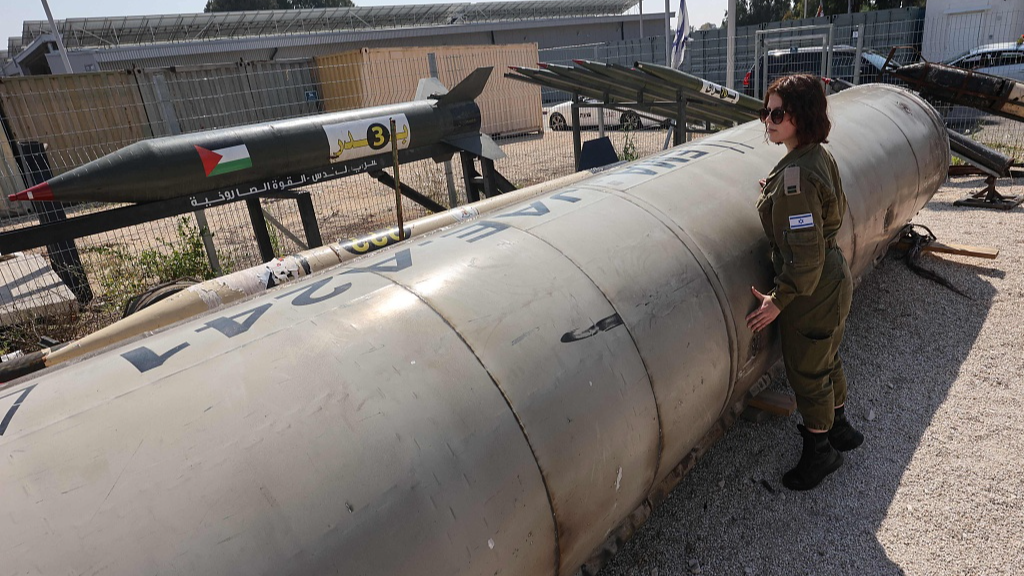The Israeli army on Saturday continued its attack on Jabalia in northern Gaza, urging residents in the area to evacuate their homes and head to shelters in western Gaza.
Army spokesperson Avichay Adraee said in a statement on social media platform X that the army eliminated “a sabotage cell in Jabalia after clashes with its members inside buildings, where the saboteurs fled to the roof and opened fire on the army forces.”
Adraee said the troops surrounded the buildings and eliminated the group after an exchange of fire, noting that the army did not suffer any losses during the clashes.
The spokesperson did not provide further details about the identity of the “saboteurs.”
Earlier in the day, Palestinian medical sources said at least 28 people, including women and children, were killed in continuous Israeli raids on the Jabalia refugee camp.
Israeli warplanes targeted several residential houses and a shelter center for displaced people in the camp with missiles, according to Xinhua, citing Palestinian security sources.
The Palestinian death toll from the ongoing Israeli attacks on the Gaza Strip has risen to 35,386, health authorities in the Palestinian enclave said in a press statement on Saturday.
The raids caused large explosions in the camp, which had been witnessing a military operation for several days.
The Israel Defense Forces (IDF) have killed more than 130 militants in targeted operations in eastern Rafah in the southern Gaza Strip, according to a statement issued on Saturday.
As part of the operations, the Givati infantry brigade killed more than 80 militants in the area and located dozens of rifles, grenades, and ammunition, according to the IDF statement.
Givati’s reconnaissance unit also uncovered significant underground tunnel infrastructure in the area, it said.
Simultaneously, the 401st armored brigade killed about 50 militants in raids on Hamas infrastructure and buildings from which gunfire was shot at IDF troops and located dozens of tunnel shafts and many anti-aircraft guns.
“So far, hundreds of terrorist infrastructure sites have been destroyed by the 401st brigade, including weapons production facilities and ready-to-use launch sites,” the IDF said.
New divisions emerge
New divisions have emerged among Israel’s leaders over post-war Gaza’s governance, with an unexpected Hamas fightback in parts of the Palestinian territory, piling pressure onto Israeli Prime Minister Benjamin Netanyahu, AFP reports.
Netanyahu came under personal attack on Saturday from war cabinet minister Benny Gantz, who threatened to resign from the body unless the premier approved a post-war plan for the Gaza Strip.
Earlier in the week, Defence Minister Yoav Gallant slammed Netanyahu for failing to rule out an Israeli government in Gaza after the war.
The prime minister’s outright rejection of post-war Palestinian leadership in Gaza has broken wide open a rift among top politicians and also frustrated relations with top ally the United States, the AFP report said.
Experts say the lack of clarity only serves to benefit Hamas, whose leader has insisted no new authority can be established in the territory without its involvement.
Gantz said Saturday that the war cabinet needed to draft and approve a broad range of plans within three weeks, including the formation of an “American, European, Arab and Palestinian administration that will manage civilian affairs in the Gaza Strip,” according to the AFP report.
Washington had previously called for a “revitalized” form of the Palestinian Authority to govern Gaza after the war. But Netanyahu has rejected any role for the Palestinian Authority in post-war Gaza, saying on Thursday that it “supports terror, educates terror, finances terror.”
Instead, Netanyahu has clung to his steadfast aim of “eliminating” Hamas, asserting that “there’s no alternative to military victory.”
Source(s): CGTN

 News4 days ago
News4 days ago
 News4 days ago
News4 days ago
 World5 days ago
World5 days ago
 World5 days ago
World5 days ago
 Sports3 days ago
Sports3 days ago
 News3 days ago
News3 days ago
 News5 days ago
News5 days ago
 Travel & Culture4 days ago
Travel & Culture4 days ago


















